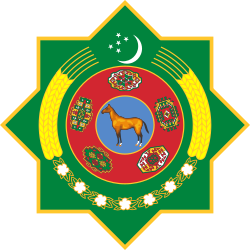| Turkmenistani Citizenship Act | |
|---|---|
 | |
| Assembly of Turkmenistan | |
| |
| Enacted by | Government of Turkmenistan |
| Status: Current legislation | |
Turkmenistani nationality law is contained in the provisions of the law of Turkmenistan on citizenship and in the relevant provisions of the Turkmenistan Constitution. A person may be a citizen of Turkmenistan through birth, restoration or through naturalisation .
